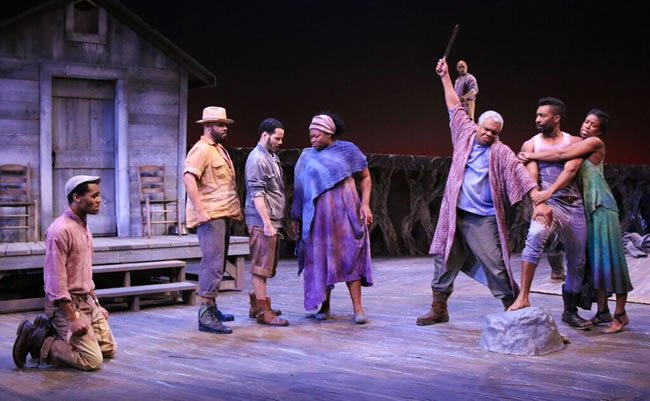 Suzan-Lori Parks has made her name updating Civil War lore in striking modernist terms in “Topdog/Underdog,” the Pulitzer Prize winner from 2001, the same year she won a MacArthur “genius” grant.
Suzan-Lori Parks has made her name updating Civil War lore in striking modernist terms in “Topdog/Underdog,” the Pulitzer Prize winner from 2001, the same year she won a MacArthur “genius” grant.
She returns to that era for her current epic, “Father Comes Home from the War (Parts 1, 2 & 3),” which is itself the first third of what will be nine parts, running into the present day.
The first three parts, all set in wartime, are making their regional debut south of the Mason-Dixon line in a strong production at the Round House Theatre in Bethesda.
Each act gets quite a different approach and even its own title. In the opening “A Measure of a Man,” the terrific local bluesman Memphis Gold picks out a song on his National steel guitar, setting the stage nearly as effectively as Tony Cisek’s set, a shack in the field and, crucially, a high road out held up by underlying twisted forms that eerily but unmistakably resemble working men, reminding us who exactly built the South.
In a scene out of a Greek tragedy, a chorus of slaves are concerned about the impending news about one of their number, ominously named Hero, and whether he will follow the slaveowner out to fight the Confederate cause. Will he die in this cause that, should the South win, would only further imprison them? Or will he believe the offer of his master: That should they win, he’d personally free him.
For Hero (JaBen Early) it’s a vexing decision (one on which everyone else places a bet). There are doubts from an elder in the group (Craig Wallace) and a wild speculation among the other slaves (Jefferson A. Russell, Stori Ayers, Ian Anthony Coleman and Jon Hudson Odom) who are so modernist (and entertainingly so) in their exchanges, one of them shouts, “Snap!”
As effective as the first part is, the second, “A Battle in the Wilderness,” set in the thick of wartime, is more compelling, where the Hero’s owner, a Colonel in the Rebel Army played with some gusto by Tim Getman, tries to convince a captive Union soldier (Michael Kevin Darnall) that they are not so different. Wouldn’t he like to have a slave up North if he could? It’s an audacious question that at the same time may hit at some unstated truths in the 21st century. Indeed, parts of the exchange are not so different than some of the outrageous statements in the uglier corner of the current political season. The central question is what Hero will do in this situation – stay loyal to his owner; help the side that wants to end slavery?
By part three, “The Union of My Confederate Parts,” the question is completely different. Will Hero have survived the war? Will he come home? And how will it have changed him? And what will have happened to his colleagues back at the plantation? Will his woman (Valeka J. Holt) have moved on to the arms of another man – in this case the aggrieved Homer (played with a special charge by KenYatta Rogers). And will Hero want to join the band of runaways (the former slaves, in different costume; a chorus of another kind) in their escape to freedom?
It almost doesn’t get answered when the return is preceded by the romping of the hero’s dog – Wallace, in quite a bounding transformation, telling truths as he wags and romps.
Like any engrossing, timeless odyssey, the combination of the three tales whet one’s appetite for how this spins out into the future — though of course the future is also often part of the language of the present (the use of the word “jet” dates back to the 17th century, but not in the way the cast members use it: “I’ve got to jet”).
Director Timothy Douglas finds a strong kinship with both script and cast to make “Father Comes Home from the Wars” particularly dynamic; at a time when Oscars can’t find actors of color to praise, in a kind of lingering injustice that may be hit on in part nine, they need only drive to Maryland.
“Father Comes Home from the Wars (Parts 1, 2 and 3)” continues through Feb. 28 at Round House Theatre, Bethesda, MD.